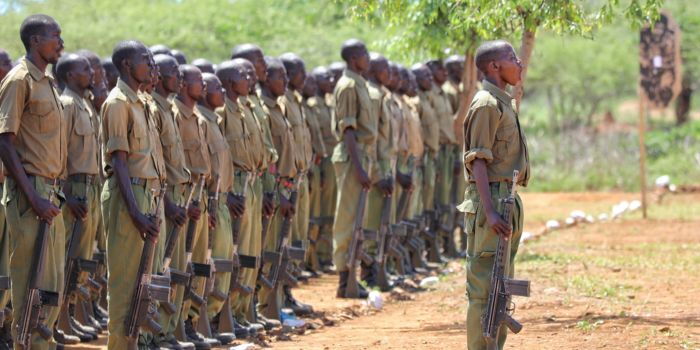
 National Police Reservists during a graduation/KITHURE KINDIKI/X
National Police Reservists during a graduation/KITHURE KINDIKI/XOn Saturday, a multi-agency operation
recovered two AK-47 rifles linked to the murder of two National Police
Reservists in Igembe, Meru County, on April 7.
The officers recovered the rifles with empty
magazines at Lemorijo village, Lengurma in Isiolo North Sub-county.
On April 7, three reservists were shot dead
by armed raiders resulting to the launch of investigations into the attack.
On Monday, Interior and National
Administration Cabinet Secretary Kipchumba Murkomen has ordered fresh vetting
for all National Police Reservists (NPSs) serving in the Kerio Valley region.
Addressing a security meeting in the area,
the CS noted those who pass the test will be retrained in service.
He also announced a new policy shift, stating
NPRs will now be under the direct command of the Officer Commanding Police
Stations (OCS).
The CS took issue with NPR officers engaging
in criminal acts, saying the process to replace them has kicked off.
“We are creating proper camps for NPRs in
Baringo, West Pokot, and Elgeyo/Marakwet,” Murkomen said.
Understanding police reservists
The National Police Reservists (NPRs) are
civilians who are officially recruited, trained and authorised to assist the
national police in maintaining law and order.
They are not full-time police officers but
serve on a part-time or voluntary basis, especially in areas where regular
police coverage is limited.
Police reservists are usually aged between 18
and 55 years, and serve voluntarily.
You must be an adult, law-abiding, and
respected in your community to qualify.
NPR officers may receive allowances as
determined by the Commission, but they are not entitled to regular salaries.
According to the National Police Service Act
of 2011, the National Security Council determines the maximum number of reserve
police officers.
Their mandates include maintenance of law and
order, preservation of peace, protection of life and property, and, prevention
and detection of crime.
NPRs have the authority to apprehend
offenders and enforce all laws and regulations with which the Service is
charged.
The Act notes that the reservists are provided
with proper uniform, service identity cards and weapons.
The government provides police reservists
with firearms, usually after their training and vetting.
Weapons are typically issued on a strict,
controlled basis, and in some cases, weapons must be surrendered when they are
not on active duty.
Ammunition and other equipment (like radios
or protective gear) are also supplied by the state.
All existing NPR officers undergo vetting to
assess their suitability and competence.
They are deployed in specific areas, with
defined commands and supervision structures, and undergoes vetting and training
before deployment.
They are typically deployed in rural, remote,
or high-risk areas where full-time police officers are too few.
Further, an NPR is bound by the same
requirements as a police officer and is supervised by the Service.
The Inspector-General undertakes the training
of police reserve officers to ensure that they are conversant with the relevant
provisions of the Constitution and the NPS Act.
Appointment and oversight
The Inspector-General advices the Service
Board from time to time determine the command structure of the police reserve
in a particular area.
Further, the Inspector-General may, by
regulations, make further provision on any matter related to the command of the
police reserve and in particular, specify how the reserve police officers shall
relate with regular Service personnel on normal and on joint Service operation.
Police reserve officers are recruited by the
National Police Service Commission upon recommendation and in consultation with
the Inspector-General.
In places facing security threats (like
banditry-prone or border regions), chiefs, local elders or other community
leaders often recommend candidates, but final vetting is done by police and
government security agencies.
They are then deployed in such areas as the
Inspector-General in consultation with the National Security Council may deem
necessary.
A certificate of appointment is issued to
every reserve police officer and as evidence of the appointment under the NPS
Act.
A reserve police officer is recruited in
accordance with the rules and regulations developed by the Commission.
A reserve officer is enlisted and trained by
the Inspector-General.
Usually they report to the Officer Commanding
Police Division (OCPD) or the local police station commander.
They are under the broader command of the
Inspector General of Police, through structures like the county police
commanders.
A police officer enrolled under the NPS Act
serves for a period of five years and is not to be re-engaged.
This is notwithstanding subsection (1), where
there is a state of war or emergency, or for as long as the regulations are in
force, as the case may be, or for such lesser period as the Inspector-General
may in any case or class of cases consider appropriate.
According to the NPS Act, police reserve officer is subject to discipline in accordance with standing orders, rules and regulations of the service.










